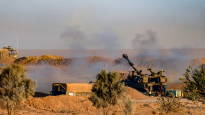WASHINGTON The last three weeks With Daniel Byman has been very busy.
Terrorism researcher Byman is one of Washington’s leading experts on counter-terrorism operations and the Israeli military.
Right now, Byman is worried about three things: the situation of Palestinian civilians, the expansion of the war in the Middle East, and whether Israel’s military actions have a realistic goal.
Hamas’s attacks on Israel were rushed in the United States to be compared to the 2001 terrorist attacks in New York, but in recent weeks the comparisons have started to sound like warnings.
– After the 2001 attacks, the United States was terribly angry. And when leaders are angry, they rarely make good decisions. Then it is also typical to act short-sightedly and not to think about the long term, says Byman.
According to him, President Joe Biden has called on Israelis to reflect on the mistakes made by the United States.
Human error of thinking in intelligence machinery
Suddenly, the terrorist attacks of 2001 are compared to Hamas’ October attacks, also because both attacks appear to be a failure of the intelligence apparatus. However, Daniel Byman warns against overly straightforward comparisons.
Al-Qaeda was able to attack the United States in part because different intelligence agencies did not share intelligence with each other. The most significant reason, however, was that the attack was unexpected: apart from a small group of intelligence insiders, no one had even heard of al-Qaeda.
– Every Israeli has heard of Hamas. The fact that the organization is hostile and wants to attack is therefore not a surprise. Only the extent of the attacks was, says Byman.
He explains the failure of Israel’s intelligence apparatus primarily with human factors.
According to Byman, Israel uses human resources and technology to monitor Hamas’ activities. However, the sources were not enough for Israel to have discovered that Hamas was training hundreds of fighters for the attack.
Another human error, according to him, is the analysis of existing intelligence.
According to Byman, Israel seems to have believed that Hamas is not capable or willing to attack Israel. According to him, it has led to a thinking error in which all intelligence that challenges the prevailing view has been ignored.
– A significant mistake in this context has also been how political realities have shaped intelligence information. Israel also faces other threats that political leaders have made a priority. Reports have indicated that Israel did not have enough troops to protect the border and it was a political decision.
Intimidation no longer works
According to Byman, the October attacks show that Israel’s main counter-terrorism tactic has failed.
According to Byman, many traditional means of countering terrorism are difficult because Hamas is not only an organization that terrorizes Israel, but also the Gaza regime. Preventing the funding of the organization is difficult, because Hamas receives funding directly from civilians, for example through taxes.
Partly for this reason, especially in recent years, Israel has used the fear of strong counterattacks in Gaza as its primary anti-terrorist tool.
– But intimidation is difficult, and it is quite clear that the attacks on October 7 seem to have failed, says Byman.
“Hamas cannot be destroyed”
At the moment, Byman is also worried about how to get help to Palestinian civilians. According to him, it would be of the utmost importance that water and electricity would work, and that humanitarian aid would reach its destination.
According to Byman, Israel must do everything possible to avoid civilian casualties. However, it is complicated above all by the fact that the Palestinians in Gaza have nowhere to escape.
When the United States fought ISIS in Mosul, Iraq, about 10,000 civilians were killed during the months-long battle. So far, Israel has already killed almost the same number of Palestinians in just a few weeks.
According to Byman, the number of civilian casualties in Mosul was influenced by the fact that many were able to flee the fighting when the city was liberated from ISIS control. Israel will not evacuate Palestinian civilians.
– First of all, Israel fears that many of them would be Hamas fighters and thus bring the enemy to their own country. But another reason is that after the attacks, there is enormous anger, partly against Hamas, but also against Palestinians in general.
According to him, the goal set by Israel for the war is unrealistic.
– I don’t think that Hamas can be destroyed. Israel can kill and arrest Hamas leaders, and can deeply damage the organization, but there is no decent alternative to Hamas in Palestine, Byman says.
It is precisely for this reason that he sees the task of the United States now being to ask Israel the hard questions. They are partly related to the United States’ own failures in the Middle East.
– The biggest question is who will rule Gaza in the future? If we pretend for a moment that the Israeli operation was successful and Hamas was destroyed, who would rule Gaza?
– And how would success in the operation be possible without dramatically higher civilian casualty figures in a situation where casualty figures are already high? How can Israel maintain even partial international support with all this going on?
– And more broadly: what exactly is a long-term solution, Byman reflects.
